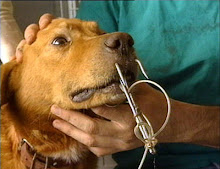Thursday, August 18, 2011
Arthritis in Pets Tips
Tips for Reducing the Signs of Arthritis in Pets
NationalPetPharmacy.com provides recommendations for nutritional management of joint disease in pets
According to the Arthritis Foundation, arthritis affects one in every five adult dogs in the United States and is one of the most common sources of chronic pain that veterinarians treat. Pet owners can easily be overwhelmed by the variety of treatment options available to help alleviate their pet's symptoms. NationalPetPharmacy.com provides the following nutritional recommendations for managing joint disease in pets.
"Unfortunately, there is no single magic cure for arthritis and joint pain in pets," states Alex Molldrem, DVM. "The most effective treatment plan typically involves a combination of weight management, nutritional supplements, dietary changes, and prescription medications."
When pets are diagnosed with arthritis, there are several nutritional changes that can be made to help alleviate the symptoms. First and foremost is the pet's weight. Approximately 25 to 40 percent of adult dogs are overweight(1). With each and every step, the excess weight pets carry around is extra impact on their joints. This persistent impact steadily erodes away any remaining joint cartilage. Slow and steady non-impact exercise, such as swimming or walking, is ideal to burn off the extra calories without further degrading joint health. Exercise not only helps maintain heart, lung, and digestive health, but it also increases blood flow and oxygenation to the joints, ultimately helping to maintain joint health and lubrication. Low calorie vet diets can also help pets shed the extra pounds.
"Joint supplements and anti-inflammatory pet meds have also proven effective in helping to protect joints and alleviate the symptoms of arthritis in pets," states Molldrem. "The most common joint supplements are glucosamine, chondroitin sulfate, and the long chain Omega-3 fatty acids, known as EPA (eicosapentaenoic acid) and DHA (docosahexaenoic acid)."
Glucosamine and chondroitin sulfate are known as disease-modifying agents. These help to improve cartilage health by providing the necessary building blocks needed to maintain and repair damaged cartilage. Both of these agents work synergistically to improve the production of glycosaminoglycans (the matrix of articular cartilage) and to reduce proteolytic activity (the catabolic breakdown of articular cartilage). These agents can be supplied via dietary supplements or injection, and several veterinarians recommend starting pets on joint supplements earlier in life, prior to the onset of arthritis, as a preventative measure.
Omega-3 fatty acids have been shown to help control joint inflammation and reduce the activity of destructive joint enzymes. These essential fatty acids have been shown to compete with arachidonic acid in the body, which is a precursor to inflammatory enzyme activity. With Omega-3 fatty acid supplementation, these fatty acids will out-compete arachidonic acid, thereby reducing the amount of destructive joint inflammation. Omega-3 fatty acids are found in high concentrations in fish oils and flaxseed.
In addition to pet supplements, anti-inflammatory and analgesic medications are commonly prescribed to maintain the comfort of an arthritic pet. These medications reduce the degree of joint swelling, which ultimately helps relieve joint pain. Owners should consult with their veterinarian to identify the right anti-inflammatory medication for their pet.
"While nutritional management of joint issues has proven very effective, others have seen great success with methods such as physical therapy, massage, acupuncture, and laser therapy to help manage their pets' arthritic symptoms," states Molldrem. "The bottom line is that you no longer need to feel helpless against your pet's struggle with arthritis and joint pain."
Labels:
Arthritis in Pets Tips
Subscribe to:
Post Comments (Atom)




3 comments:
i love dogs!!! they are very calm and composed!! for more helpful tips check my link rhinoplasty price
arthritis .. NIce pic of dogs ..
I am afraid of dogs but love to see the cats, they are looking very innocent.
Post a Comment